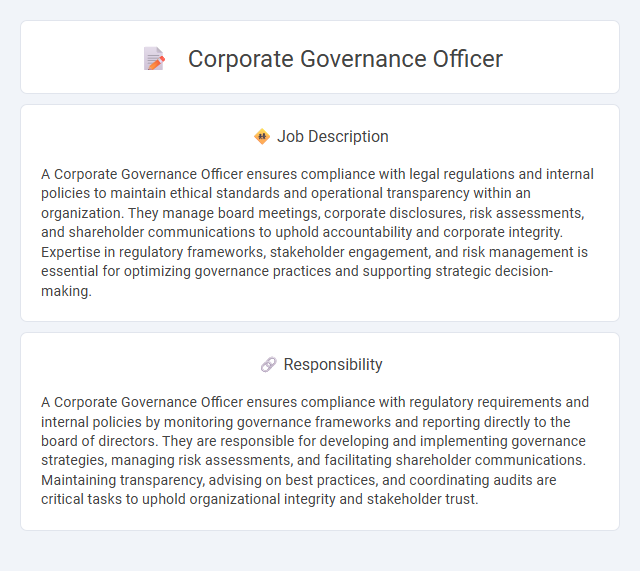
A Corporate Governance Officer ensures compliance with legal regulations and internal policies to maintain ethical standards and operational transparency within an organization. They manage board meetings, corporate disclosures, risk assessments, and shareholder communications to uphold accountability and corporate integrity. Expertise in regulatory frameworks, stakeholder engagement, and risk management is essential for optimizing governance practices and supporting strategic decision-making.
Individuals with strong ethical values, attention to detail, and excellent communication skills are likely to be well-suited for a Corporate Governance Officer role. Those comfortable navigating complex regulatory environments and promoting transparency within organizations may find this position aligns with their strengths. People who prefer collaborative problem-solving and policy development could probably thrive in this capacity.
Qualification
A Corporate Governance Officer typically requires a bachelor's degree in business administration, law, or a related field, with professional certifications such as Certified Corporate Governance Professional (CCGP) enhancing credibility. Proven expertise in regulatory compliance, risk management, and board relations is essential, alongside strong analytical and communication skills. Experience with corporate law, ethics programs, and governance frameworks like SOX or OECD guidelines is highly valued for ensuring effective oversight and strategic alignment.
Responsibility
A Corporate Governance Officer ensures compliance with regulatory requirements and internal policies by monitoring governance frameworks and reporting directly to the board of directors. They are responsible for developing and implementing governance strategies, managing risk assessments, and facilitating shareholder communications. Maintaining transparency, advising on best practices, and coordinating audits are critical tasks to uphold organizational integrity and stakeholder trust.
Benefit
A Corporate Governance Officer likely enhances organizational transparency and accountability, which may lead to improved investor confidence and regulatory compliance. This role potentially reduces risks related to legal issues and reputational damage by ensuring adherence to governance policies. Companies employing a Corporate Governance Officer could see better decision-making processes and long-term sustainability benefits.
Challenge
Corporate Governance Officer roles likely involve navigating complex regulatory environments and balancing stakeholder interests, which could pose significant challenges. Ensuring transparency and compliance in dynamic markets may require continuous adaptation and strategic foresight. There is a strong probability that the job demands meticulous risk management to uphold corporate integrity.
Career Advancement
A Corporate Governance Officer plays a critical role in ensuring compliance with regulatory requirements and promoting ethical business practices, which enhances organizational Reputation and stakeholder trust. Mastery of governance frameworks and risk management strategies positions professionals for leadership roles such as Chief Compliance Officer or Board Secretary. Career advancement in this field often involves obtaining certifications like CCG (Certified Corporate Governance) or pursuing an MBA with a focus on corporate governance and ethics.
 kuljobs.com
kuljobs.com